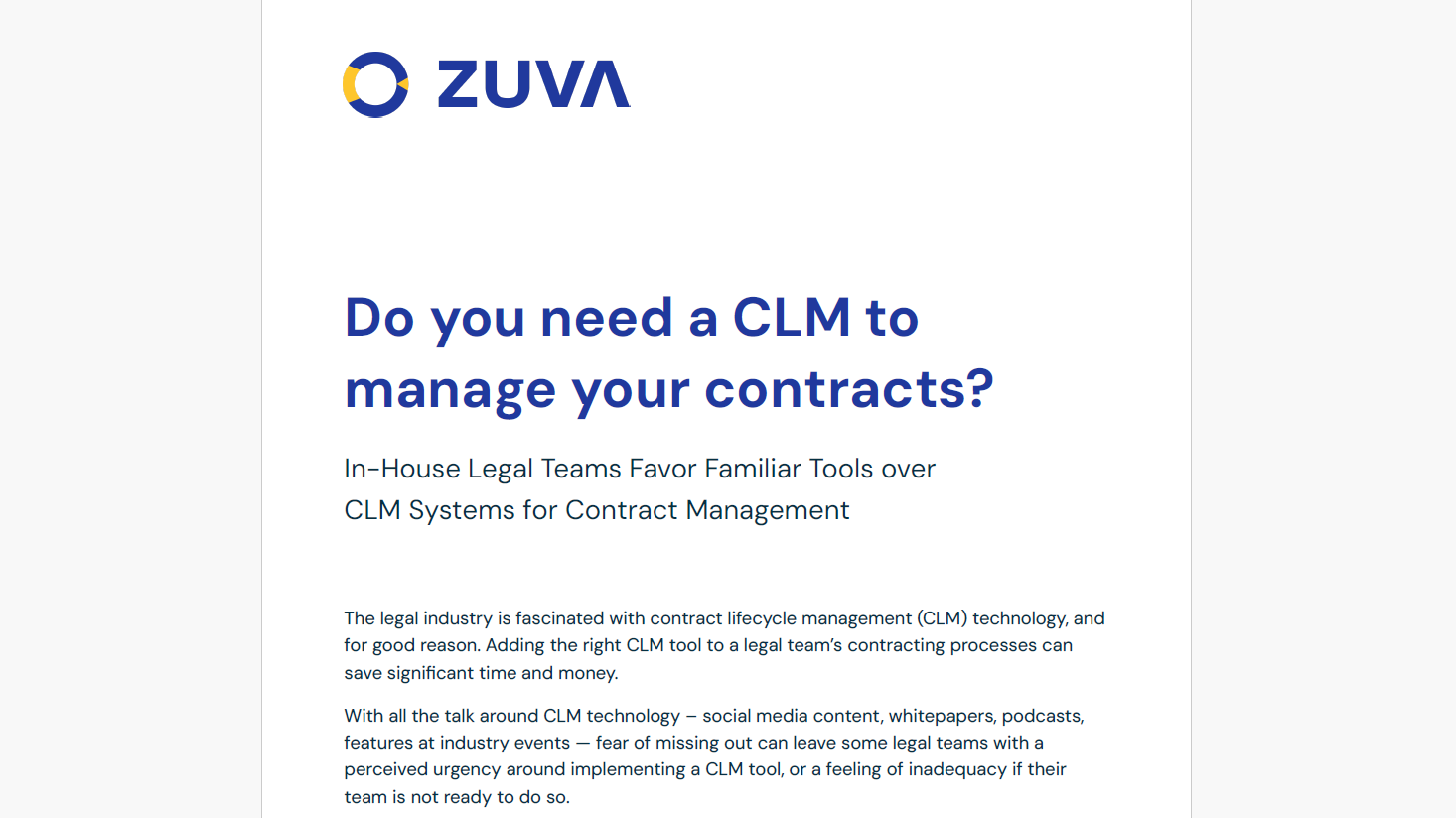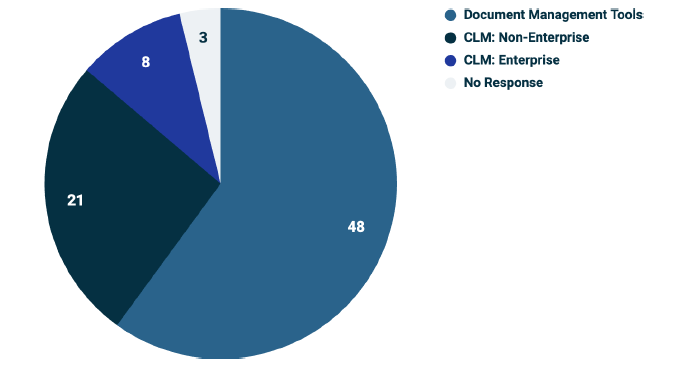One of the most talked-about legal technologies of the last few years is contract lifecycle management software. But a survey released today finds that the majority of companies do not use CLM software at all, and of those that do have a dedicated CLM system, most use it only on a limited basis.
Instead of CLM systems, most companies are using document management systems to store and manage their contracts — systems such as SharePoint, Google Drive, local drives, or commercial DMS products.
The survey, Do You Need A CLM to Manage Your Contracts?, was conducted by the legal technology company Zuva, which sells neither CLM or DMS software, but rather AI-powered contract analysis technology. Given that, you may wonder why Zuva conducted this survey.
It did so, Zuva says, because it wanted to counter the assumption among many companies “that everyone who is anyone is using a dedicated CLM tool.”
“We found in our research that a lot of companies who aren’t using a CLM or aren’t using a CLM enterprise-wide feel badly about the state their contract management is in,” Zuva explained. “We want to help organizations celebrate their wins, no matter the size, no matter their contract management journey.”
But, not surprisingly, there is also a commercial spin to Zuva’s survey, which I will get to farther on.
Key Findings
The survey consisted of interviews with 80 companies, 32 with more than 10,000 employees and 48 with less than 10,000. The companies spanned a range of industries.
Among the key findings:
- Document management tools prevail. Of the companies surveyed, 86% use document management tools for contract storage and management. A majority of the organizations (60%) that are using a document management tool for contract management do not use a CLM system at all.
- CLM adoption lags. A minority of companies (36%) use a dedicated CLM system. Of that 36% that use a dedicated CLM, barely more than a quarter (28%) use the CLM system throughout the enterprise.
- Contract management is not one-size-fits-all. Each organization surveyed tailored its contract management approach, not only with the tools used, but with the way they used them. Some companies prioritized storage, others emphasized searchability, and others focused on contract data.
“We found from our conversations that, despite the CLM hype, most companies have not purchased a dedicated CLM system,” the survey says. “Those who have purchased a dedicated CLM are unlikely to be using that CLM enterprise-wide. Instead, the CLM is just one of many tools used in that company’s contract management efforts.”
CLM vs. DMS
Of the companies using a CLM, interviewers asked what they saw as the software’s pain points. The top ones they identified were:
- Difficulty tracking contract obligations, due to limitations in CLM metadata extraction capabilities.
- Difficulty finding relationships between related documents, because of limitations in CLM parent/child linking capabilities.
- Difficulty finding contracts in CLM, due to limitations in CLM organization and limited search functionality.
- Inconsistent internal adoption and change-management challenges, for the same reasons that adopting any new system can be difficult.
- Insufficient collaboration capabilities, causing CLM users to often work outside the CLM system.
By contrast, in-house legal teams expressed a preference for using DMS systems over dedicated CLMs. Among the reasons why:
- Ease of enterprise use, because the use of familiar tools for contract management allow for easier enterprise-wide adoption.
- Intuitive storage and an easy-to-use repository.
- Search capabilities.
- Ability to manage access.
That said, the survey found that contract management using a DMS has many challenges. Among those:
- Metadata extraction is manual and prone to human error.
- Companies sometimes have different contract management processes by department, meaning storage of contracts is not consolidated, and they cannot easily understand metadata across the business.
- Storage and organization is only as good as the setup.
- Teams can miss important information (e.g., renewals) if that information is not tracked.
- Document management tools often do not talk to other contract management systems or other systems where linking that data would be valuable.
- Limited-to-no ability to collaborate with team members on documents in draft form or in negotiation.
So Which Is Better?
So which is better for contract management — a DMS or a CLM? The sum of the survey’s findings seems to summon a scenario of “damned if you do, damned if you don’t.” But the report suggests a company can have its DMS cake and eat it too.
For companies that want to stick with their DMS but overcome some of its challenges for contract management, the report offers three suggestions:
- Implement workflow automations around contract processes to send notifications or trigger other types of automations.
- Explore hybrid solutions that combine use of a DMS with a tool such as a CLM, but perhaps use the CLM only for the most high-risk contracts, leaving those such as NDAs to the DMS.
- Use third-party data extraction and data visualization tools to better understand what’s in an organization’s contracts.
I told you above that there was a commercial angle here somewhere, and that last bullet is where it is. This is what Zuva does. Its DocAI is an API-driven technology that allows companies to extract important data from contracts and stores it somewhere where it can be of use to them.
But the report quickly moves off that brief commercial message to return to the theme mentioned above of helping organizations “celebrate their wins.”
The fact of the matter, it notes, is that many organizations are doing virtually nothing to manage their contracts, or at best are using a spreadsheet.
Given that, it concludes, “If you have any process for managing your contracts at all, you’re doing great. You should know that you are well ahead of many of your peers.”
“We hope our study helps celebrate unique approaches to contract management,” said Lily Schurra, head of API product marketing at Zuva, “and we encourage organizations to feel confident in their current contract management efforts and to explore solutions that complement their existing workflows.”
 Robert Ambrogi Blog
Robert Ambrogi Blog
